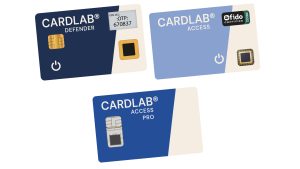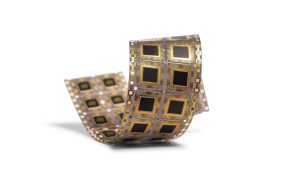Your online identity faces constant threats that traditional security measures struggle to combat. This article delves into the benefits of offline biometric identity verification and tokenisation as a more secure and convenient solution.
Offline biometric verification and tokenisation tackle critical cybersecurity challenges, such as identity, credential, and access management (ICAM), while seamlessly integrating with existing software solutions.
The cybersecurity dilemma
For years, the notion that robust encryption and complex passwords are sufficient to safeguard our data and identity has prevailed. However, the reality is starkly different. Hackers have evolved, employing sophisticated tools that have raised the cost of cybercrime to an alarming $9.22 trillion by 2024. With the proliferation of connected devices, new avenues for cyber attacks emerge daily. Without decisive action, this figure will only escalate.
CardLab has dedicated extensive efforts to developing cutting-edge solutions to fortify data, networks, critical infrastructure, and personal identities. Faced with conventional security methods struggling to keep pace with evolving threats, CardLab has introduced a more secure and user-friendly alternative – offline biometric identity verification coupled with tokenisation. This innovative approach eliminates the need for static passwords and diminishes reliance on password managers, both of which are susceptible to hacking and compromise. Notably, a recent massive hack saw a staggering 16 billion passwords pilfered from platforms like Facebook, Google, and Apple.
Passwords, static credentials, online tokens, and even multi-factor authentication (MFA) remain prime targets for cyber attackers, fostering a complexity that encourages insecure user practices. Passwords can be stolen, databases breached, and MFA methods intercepted, introducing new attack vectors and impeding user experience.
CardLab offers a comprehensive solution to these challenges with:
- Biometric data stored offline on the biometric card: Unlike central biometric databases and smartphone-based verification, storing the fingerprint offline on the card shields it from hackers, ensuring user control. Offline biometric verification occurs beyond the reach of online threats.
- Tokenisation of user identity/data: CardLab moves token generation offline, directly on the card post successful fingerprint verification. Even if intercepted in a “man-in-the-middle” attack, the token is useless to hackers until authenticated in the secure CardLab backend system.
- Preventing human error & social engineering: CardLab’s biometric identity tokenisation eradicates the risk of password reuse, a common practice that amplifies the impact of data breaches. By eliminating static passwords entirely, the solution enhances security and user convenience. Furthermore, CardLab’s solution is FIDO certified, ensuring robust security.
CardLab’s solution serves as a versatile platform catering to various sectors for identity verification and authentication. The card hosts an embedded Secure Element capable of accommodating multiple applets, including digital identity wallets, passports, financial applications, medical records, driver’s licenses, FIDO applets, digital signing certificates, and crypto custodian wallets. The card mimics smartphone app functionalities but operates within a secure offline environment, offering heightened protection. Key applications include:
- EU Digital Identity Wallet: Operated offline, rendering it exceedingly challenging for hackers to breach, in contrast to online platforms susceptible to exploitation.
- Secure medical records: Medical data stored in the card’s Secure Element is only accessible upon successful fingerprint verification.
- Tamper-proof insurance certificates: Mitigates insurance fraud by hindering identity manipulation through counterfeit identity documents.
- Protection of critical infrastructure: Facilitates tokenised access control to safeguard essential services from unauthorised access.
- Combined physical and logical access: Replaces passwords with biometric verification, trimming IT maintenance costs and reducing ransomware risks when combined with basic cybersecurity initiatives.
- Self-custodian wallet for crypto or digital assets: Shields digital assets from theft by providing an offline storage solution, countering vulnerabilities in online wallets.

Crypto wallets demand heightened security, and data tokenisation aids users in maintaining protection and adhering to Anti Money Laundering (AML) regulations. This is precisely the approach adopted by Vaultavo, leveraging CardLab technology for their solution.
Vaultavo: Revolutionary biometric custody infrastructure
2025 has emerged as a pivotal year in crypto security history, marked by staggering digital asset theft exceeding $2.17 billion in just six months. A single breach, exemplified by the ByBit hack, witnessed $1.5 billion vanish overnight, purportedly orchestrated by a state-sponsored cybercrime entity.
However, the targets extend beyond institutions, with individuals – investors, founders, employees – falling prey to phishing links, deepfakes, leaked credentials, and even physical assaults. “Wrench attacks” have surged to unprecedented levels as criminals transition from virtual to physical threats.
At the core of these incidents lies a common vulnerability: antiquated access models governing a trillion-dollar digital economy.
Within this climate of vulnerability, Vaultavo emerges as a fully biometric, hardware-reinforced custody infrastructure redefining the security, governance, and accessibility of digital assets.
The Vaultavo smartcard: Your fingerprint is the key
Central to Vaultavo’s system is an unparalleled smartcard engineered and manufactured in collaboration with CardLab.
This isn’t a typical card. It integrates an FPC biometric fingerprint sensor, EAL6+ certified secure element, dynamic E-Ink display, multi-interface connectivity (USB-C, contactless, Bluetooth), and an onboard rechargeable power source.
What sets it apart is its security architecture: fingerprint data is never transmitted, stored externally, or uploaded. Matching occurs locally, completely offline within the card’s secure element. This ensures that biometric data remains entirely under user control, impervious to online threats or external databases.
The card is air-gapped, tamper-resistant, and inaccessible without the registered fingerprint. With no seed phrases to misplace, no passwords to pilfer, and no reliance on mobile devices or applications, security is contingent on the user, thwarting credential reuse and rendering account takeovers nearly impossible.
Beyond the card: Infrastructure for every custody model
Vaultavo’s innovation transcends the smartcard, extending to a comprehensive platform of secure vaults and administrative controls safeguarding and regulating digital asset usage. In this layered design, biometric data is stored and matched solely within the card’s secure element, never departing from the user’s possession. Private keys, in contrast, reside in separate, highly secure hardware security modules (HSMs) within dedicated vault environments.
This intentional segregation of biometric identity and private key storage eliminates a single point of failure. Even in the event of a breach, the architecture thwarts attackers from accessing both authentication credentials and the assets they protect. This model hinges on physical separation, zero trust, and user-controlled authentication.
All transactions flow through a modular digital platform enabling institutions to assign role-based access, enforce compliance protocols, and automate governance procedures. Offline biometric authentication eliminates the necessity for central identity databases, drastically reducing the attack surface.
Supporting nearly every custody model, from cold storage to consumer wallets, Vaultavo’s access and control are anchored in physical fingerprint validation.
Vaultavo tackles the industry’s custody trilemma – the notion that security, accessibility, and ownership are incompatible. While others compromise, Vaultavo harmonises all three by embedding them in hardware, identity, and infrastructure.
Its impact has garnered recognition. In 2025, Vaultavo clinched the Blockchain Innovation Award at the Asian Banking & Finance FinTech Awards and secured a Top Finalist spot in Accenture’s FinTech Innovation Lab Asia-Pacific.
Yet, its true significance lies in its timeliness. As crypto crime peaks and the line between digital and physical threats blurs, Vaultavo signifies a pivotal evolution. It offers a system where security reigns supreme, custody is verifiable, and the sole key of consequence is the one entrenched in your fingerprint.
CardLab’s solutions, provided to Vaultavo and others, are only as reliable as the precision and resilience of the underlying technology. To ensure CardLab products meet the standards for identity verification, CardLab collaborates closely with multiple high-security chip providers, notably FPC, for their fingerprint sensors renowned for accuracy, security, and durability.
Like CardLab, FPC understands the escalating data breaches and high-profile digital currency thefts underscore the urgent need for robust, user-centric security solutions. Through its trajectory, FPC acknowledges that conventional access control methods – passwords, PINs, or hardware tokens – are increasingly vulnerable to phishing, social engineering, and remote breaches.
Conversely, biometric authentication offers a more secure and intuitive solution by tethering access to an individual’s unique physical traits, rather than what they know or possess. Biometrics furnish a primary or secondary authentication factor, fortifying security layers by firmly linking access to an individual and negating the risk of lost, stolen, or shared credentials.

FPC’s T-Shape biometric solution, particularly the FPC1323 sensor, epitomises the potency of biometrics in today’s security landscape. Tailored for integration into smart cards, wearables, and constrained form factors, the FPC1323 delivers a low-power, high-performance fingerprint authentication system. Its ultra-thin design and energy-efficient structure make it ideal for battery-powered or battery-free devices, while its advanced algorithms ensure swift and highly accurate verification.
The FPC T-Shape family incorporates anti-spoofing technology, developed for the payments sector, where the FPC1323 solution in a payment card is certified by both VISA and Mastercard. This certification assures companies and customers that FPC’s solutions adhere to stringent security standards. Whether securing cryptocurrency wallets, authenticating transactions, or safeguarding sensitive access points, the FPC1323 binds each interaction to a verified identity – one impervious to duplication or compromise.
This user-bound access markedly diminishes fraud, identity theft, and unauthorised account takeovers. By storing and matching biometric data securely on the CardLab card itself, without the need for external transmission or storage, the attack surface is further reduced, addressing GDPR and privacy constraints. For financial institutions, digital asset providers, and end-users alike, FPC’s biometric solution instils confidence by creating a secure, seamless experience. In a world besieged by digital threats, the FPC1323 T-Shape sensor emerges as a crucial defense, indicating that the future of secure access lies not in memory but in identity.
Safeguarding the digital realm
Amid evolving cyber threats, organisations must adopt solutions offering maximal protection without compromising convenience. CardLab’s access control solutions tackle these challenges by employing offline biometric verification to ensure the security of sensitive data at every stage.
By eliminating the need for passwords and network-dependent tokens, this card furnishes a future-proof access control solution that is scalable, seamlessly integrable with existing systems, and compliant with global privacy standards. Whether securing enterprise facilities, protecting government data, digital wallet data, or ensuring compliance in financial institutions, CardLab’s system emerges as the preeminent solution for the contemporary realm of access control, wallets, passkeys, and beyond.
In conclusion, while the focus has primarily been on security in this article, it’s essential to underscore that the CardLab system